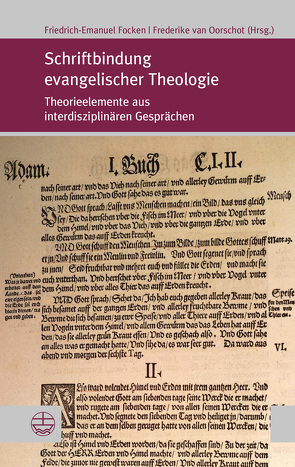
Allein die Schrift – diese Forderung Luthers beschreibt bis heute einen Selbstanspruch evangelischer Theologie. Das Schriftprinzip ist in den letzten Jahrzehnten jedoch erodiert, obwohl es als ein identity marker der protestantischen Theologie für ihr Selbstverständnis und den Zusammenhalt ihrer Teildisziplinen entscheidend ist.
Vor dem Hintergrund dieser Krise des Schriftprinzips entwickeln Nachwuchswissenschaftler und -wissenschaftlerinnen aus den Fächern Altes und Neues Testament sowie Dogmatik und Ethik Elemente einer interdisziplinären Theorie über die „Schriftbindung evangelischer Theologie“. Unter diesem Programmbegriff entfalten sie ein relationales Modell, das die Schrift in ihren Beziehungen zu Hörenden, Lesenden und deren Gemeinschaften mit je unterschiedlichen Traditionen beschreibt. Dabei stehen die Pluralität, Einheit, Normativität und Autorität der Schrift im Fokus.
[Commitment to Scripture in Protestant Theology. Theoretical Elements from Interdisciplinary Discussions
Scripture alone - this demand of Luther's still describes a self-claim of Protestant theology today. However, the scriptural principle has been eroded in recent decades, although as an identity marker of Protestant theology it is decisive for its self-understanding and the cohesion of its sub-disciplines.
Against the background of this crisis of the scriptural principle, young scholars from the subjects Old and New Testament as well as dogmatics and ethics are developing elements of an interdisciplinary theory on the "scriptural commitment of Protestant theology". Under this programme concept they develop a relational model that describes scripture in its relations to hearers, readers and their communities with different traditions. Thereby the focus is on the plurality, unity, normativity and authority of Scripture.
Aktualisiert: 2022-06-03
> findR *
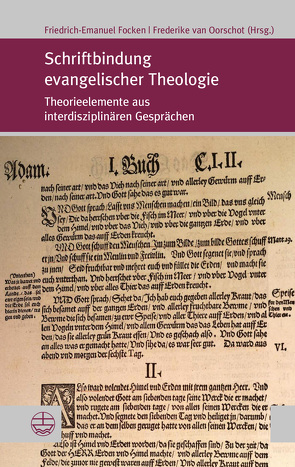
Allein die Schrift – diese Forderung Luthers beschreibt bis heute einen Selbstanspruch evangelischer Theologie. Das Schriftprinzip ist in den letzten Jahrzehnten jedoch erodiert, obwohl es als ein identity marker der protestantischen Theologie für ihr Selbstverständnis und den Zusammenhalt ihrer Teildisziplinen entscheidend ist.
Vor dem Hintergrund dieser Krise des Schriftprinzips entwickeln Nachwuchswissenschaftler und -wissenschaftlerinnen aus den Fächern Altes und Neues Testament sowie Dogmatik und Ethik Elemente einer interdisziplinären Theorie über die „Schriftbindung evangelischer Theologie“. Unter diesem Programmbegriff entfalten sie ein relationales Modell, das die Schrift in ihren Beziehungen zu Hörenden, Lesenden und deren Gemeinschaften mit je unterschiedlichen Traditionen beschreibt. Dabei stehen die Pluralität, Einheit, Normativität und Autorität der Schrift im Fokus.
[Commitment to Scripture in Protestant Theology. Theoretical Elements from Interdisciplinary Discussions
Scripture alone - this demand of Luther's still describes a self-claim of Protestant theology today. However, the scriptural principle has been eroded in recent decades, although as an identity marker of Protestant theology it is decisive for its self-understanding and the cohesion of its sub-disciplines.
Against the background of this crisis of the scriptural principle, young scholars from the subjects Old and New Testament as well as dogmatics and ethics are developing elements of an interdisciplinary theory on the "scriptural commitment of Protestant theology". Under this programme concept they develop a relational model that describes scripture in its relations to hearers, readers and their communities with different traditions. Thereby the focus is on the plurality, unity, normativity and authority of Scripture.
Aktualisiert: 2022-04-01
> findR *
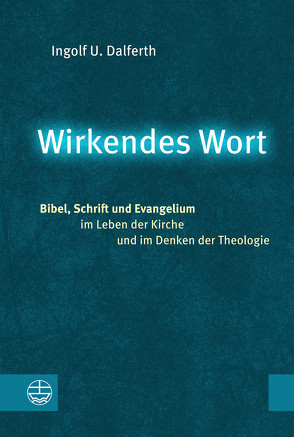
Wieder einmal gibt es in der evangelischen Theologie und Kirche in Deutschland einen Streit um das Alte Testament und die Bedeutung von Schrift und Schriftauslegung. Das ist gut so. Ohne diesen Streit würde das, was sich in Kirche und Theologie eingebürgert hat, nur noch so verstanden, wie es gerade weithin verstanden wird: nämlich missverstanden.
Missverstehen ist leicht. Das gilt gerade für die Schrift. Im Gegensatz zur geläufigen Annahme ist die eigentliche Herausforderung nicht, wie die Schrift zu verstehen ist, sondern, was man eigentlich verstehen will. Es geht nicht primär um die Methoden, sondern um den Gegenstand der Auslegung: die Schrift, die zur Kommunikation des Evangeliums gebraucht wird, durch das sich Gottes Wort im Leben der Menschen wirksam zur Geltung bringt.
Seit Längerem neigt die Systematische Theologie dazu, den Umgang mit biblischen Texten aus der systematischen Reflexion des Glaubens auszublenden. Eine Neubesinnung auf die Aufgaben einer theologischen Lehre von der Schrift ist überfällig. Ingolf U. Dalferth bietet diese Neubesinnung in einem großen Wurf, der ein Jahrhundert nach Karl Barths Römerbrief die Theologie am Beginn des neuen Jahrtausends überall dort aufschrecken wird, wo ein theologisches Ethos überlebt hat, das sich Glauben und Kirche zugehörig weiß. Dalferth verbindet seine Ausführungen auch mit praktischen Reformüberlegungen. Das »Leben der Kirche« und das »Denken der Theologie« werden so neu aufeinander bezogen.
[Verbum efficax. Bible, Scripture and Gospel in the Life of the Church and in Theology]
Once again there is a dispute about the Old Testament and the significance of Scripture for theology and church in Protestant theology and churches in Germany. That's a good thing. Without this controversy, what has become the established view in church and theology would continue to be understood in the way in which it is in fact understood – namely misunderstood. Misunderstanding is easy, understanding requires a serious effort. This is especially true for understanding Scripture. For in contrast to the common assumption, the real challenge is not how to understand Scripture, but what one actually wants to understand. It is not primarily about methods, but about the subject of interpretation, namely Scripture that is used to communicate the Gospel, through which God's Word is effectively brought to bear on people's lives.
For some time now, Systematic Theology has tended to ignore the interpretation of biblical texts in the systematic reflection of faith. A reconsideration of the tasks of a theological doctrine of Scripture is long overdue. One century after Karl Barth's Letter to the Romans, Ingolf U. Dalferth offers a reconsideration of these issues in a major monograph that will startle theologians at the beginning of the new millennium wherever a theological ethos that unites faith and church has survived. Dalferth also combines his remarks with practical reform considerations. The »Life of the Church« and the »Thinking of Theology« are thus interrelated in a new way.
Aktualisiert: 2022-04-01
> findR *
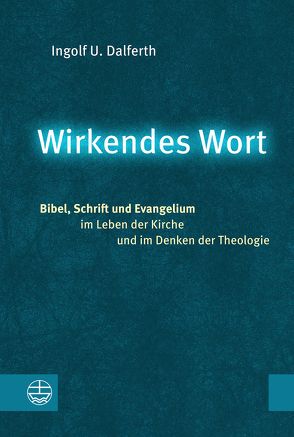
Wieder einmal gibt es in der evangelischen Theologie und Kirche in Deutschland einen Streit um das Alte Testament und die Bedeutung von Schrift und Schriftauslegung. Das ist gut so. Ohne diesen Streit würde das, was sich in Kirche und Theologie eingebürgert hat, nur noch so verstanden, wie es gerade weithin verstanden wird: nämlich missverstanden.
Missverstehen ist leicht. Das gilt gerade für die Schrift. Im Gegensatz zur geläufigen Annahme ist die eigentliche Herausforderung nicht, wie die Schrift zu verstehen ist, sondern, was man eigentlich verstehen will. Es geht nicht primär um die Methoden, sondern um den Gegenstand der Auslegung: die Schrift, die zur Kommunikation des Evangeliums gebraucht wird, durch das sich Gottes Wort im Leben der Menschen wirksam zur Geltung bringt.
Seit Längerem neigt die Systematische Theologie dazu, den Umgang mit biblischen Texten aus der systematischen Reflexion des Glaubens auszublenden. Eine Neubesinnung auf die Aufgaben einer theologischen Lehre von der Schrift ist überfällig. Ingolf U. Dalferth bietet diese Neubesinnung in einem großen Wurf, der ein Jahrhundert nach Karl Barths Römerbrief die Theologie am Beginn des neuen Jahrtausends überall dort aufschrecken wird, wo ein theologisches Ethos überlebt hat, das sich Glauben und Kirche zugehörig weiß. Dalferth verbindet seine Ausführungen auch mit praktischen Reformüberlegungen. Das »Leben der Kirche« und das »Denken der Theologie« werden so neu aufeinander bezogen.
[Verbum efficax. Bible, Scripture and Gospel in the Life of the Church and in Theology]
Once again there is a dispute about the Old Testament and the significance of Scripture for theology and church in Protestant theology and churches in Germany. That's a good thing. Without this controversy, what has become the established view in church and theology would continue to be understood in the way in which it is in fact understood – namely misunderstood. Misunderstanding is easy, understanding requires a serious effort. This is especially true for understanding Scripture. For in contrast to the common assumption, the real challenge is not how to understand Scripture, but what one actually wants to understand. It is not primarily about methods, but about the subject of interpretation, namely Scripture that is used to communicate the Gospel, through which God's Word is effectively brought to bear on people's lives.
For some time now, Systematic Theology has tended to ignore the interpretation of biblical texts in the systematic reflection of faith. A reconsideration of the tasks of a theological doctrine of Scripture is long overdue. One century after Karl Barth's Letter to the Romans, Ingolf U. Dalferth offers a reconsideration of these issues in a major monograph that will startle theologians at the beginning of the new millennium wherever a theological ethos that unites faith and church has survived. Dalferth also combines his remarks with practical reform considerations. The »Life of the Church« and the »Thinking of Theology« are thus interrelated in a new way.
Aktualisiert: 2022-04-01
> findR *
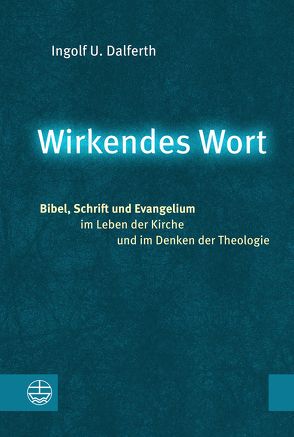
Wieder einmal gibt es in der evangelischen Theologie und Kirche in Deutschland einen Streit um das Alte Testament und die Bedeutung von Schrift und Schriftauslegung. Das ist gut so. Ohne diesen Streit würde das, was sich in Kirche und Theologie eingebürgert hat, nur noch so verstanden, wie es gerade weithin verstanden wird: nämlich missverstanden.
Missverstehen ist leicht. Das gilt gerade für die Schrift. Im Gegensatz zur geläufigen Annahme ist die eigentliche Herausforderung nicht, wie die Schrift zu verstehen ist, sondern, was man eigentlich verstehen will. Es geht nicht primär um die Methoden, sondern um den Gegenstand der Auslegung: die Schrift, die zur Kommunikation des Evangeliums gebraucht wird, durch das sich Gottes Wort im Leben der Menschen wirksam zur Geltung bringt.
Seit Längerem neigt die Systematische Theologie dazu, den Umgang mit biblischen Texten aus der systematischen Reflexion des Glaubens auszublenden. Eine Neubesinnung auf die Aufgaben einer theologischen Lehre von der Schrift ist überfällig. Ingolf U. Dalferth bietet diese Neubesinnung in einem großen Wurf, der ein Jahrhundert nach Karl Barths Römerbrief die Theologie am Beginn des neuen Jahrtausends überall dort aufschrecken wird, wo ein theologisches Ethos überlebt hat, das sich Glauben und Kirche zugehörig weiß. Dalferth verbindet seine Ausführungen auch mit praktischen Reformüberlegungen. Das »Leben der Kirche« und das »Denken der Theologie« werden so neu aufeinander bezogen.
[Verbum efficax. Bible, Scripture and Gospel in the Life of the Church and in Theology]
Once again there is a dispute about the Old Testament and the significance of Scripture for theology and church in Protestant theology and churches in Germany. That's a good thing. Without this controversy, what has become the established view in church and theology would continue to be understood in the way in which it is in fact understood – namely misunderstood. Misunderstanding is easy, understanding requires a serious effort. This is especially true for understanding Scripture. For in contrast to the common assumption, the real challenge is not how to understand Scripture, but what one actually wants to understand. It is not primarily about methods, but about the subject of interpretation, namely Scripture that is used to communicate the Gospel, through which God's Word is effectively brought to bear on people's lives.
For some time now, Systematic Theology has tended to ignore the interpretation of biblical texts in the systematic reflection of faith. A reconsideration of the tasks of a theological doctrine of Scripture is long overdue. One century after Karl Barth's Letter to the Romans, Ingolf U. Dalferth offers a reconsideration of these issues in a major monograph that will startle theologians at the beginning of the new millennium wherever a theological ethos that unites faith and church has survived. Dalferth also combines his remarks with practical reform considerations. The »Life of the Church« and the »Thinking of Theology« are thus interrelated in a new way.
Aktualisiert: 2020-11-06
> findR *
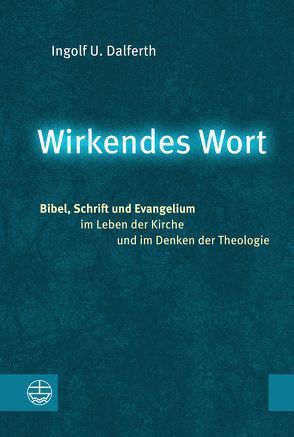
Wieder einmal gibt es in der evangelischen Theologie und Kirche in Deutschland einen Streit um das Alte Testament und die Bedeutung von Schrift und Schriftauslegung. Das ist gut so. Ohne diesen Streit würde das, was sich in Kirche und Theologie eingebürgert hat, nur noch so verstanden, wie es gerade weithin verstanden wird: nämlich missverstanden.
Missverstehen ist leicht. Das gilt gerade für die Schrift. Im Gegensatz zur geläufigen Annahme ist die eigentliche Herausforderung nicht, wie die Schrift zu verstehen ist, sondern, was man eigentlich verstehen will. Es geht nicht primär um die Methoden, sondern um den Gegenstand der Auslegung: die Schrift, die zur Kommunikation des Evangeliums gebraucht wird, durch das sich Gottes Wort im Leben der Menschen wirksam zur Geltung bringt.
Seit Längerem neigt die Systematische Theologie dazu, den Umgang mit biblischen Texten aus der systematischen Reflexion des Glaubens auszublenden. Eine Neubesinnung auf die Aufgaben einer theologischen Lehre von der Schrift ist überfällig. Ingolf U. Dalferth bietet diese Neubesinnung in einem großen Wurf, der ein Jahrhundert nach Karl Barths Römerbrief die Theologie am Beginn des neuen Jahrtausends überall dort aufschrecken wird, wo ein theologisches Ethos überlebt hat, das sich Glauben und Kirche zugehörig weiß. Dalferth verbindet seine Ausführungen auch mit praktischen Reformüberlegungen. Das »Leben der Kirche« und das »Denken der Theologie« werden so neu aufeinander bezogen.
[Verbum efficax. Bible, Scripture and Gospel in the Life of the Church and in Theology]
Once again there is a dispute about the Old Testament and the significance of Scripture for theology and church in Protestant theology and churches in Germany. That's a good thing. Without this controversy, what has become the established view in church and theology would continue to be understood in the way in which it is in fact understood – namely misunderstood. Misunderstanding is easy, understanding requires a serious effort. This is especially true for understanding Scripture. For in contrast to the common assumption, the real challenge is not how to understand Scripture, but what one actually wants to understand. It is not primarily about methods, but about the subject of interpretation, namely Scripture that is used to communicate the Gospel, through which God's Word is effectively brought to bear on people's lives.
For some time now, Systematic Theology has tended to ignore the interpretation of biblical texts in the systematic reflection of faith. A reconsideration of the tasks of a theological doctrine of Scripture is long overdue. One century after Karl Barth's Letter to the Romans, Ingolf U. Dalferth offers a reconsideration of these issues in a major monograph that will startle theologians at the beginning of the new millennium wherever a theological ethos that unites faith and church has survived. Dalferth also combines his remarks with practical reform considerations. The »Life of the Church« and the »Thinking of Theology« are thus interrelated in a new way.
Aktualisiert: 2022-04-01
> findR *
MEHR ANZEIGEN
Bücher zum Thema Heilige Schrift im Christentum
Sie suchen ein Buch über Heilige Schrift im Christentum? Bei Buch findr finden Sie eine große Auswahl Bücher zum
Thema Heilige Schrift im Christentum. Entdecken Sie neue Bücher oder Klassiker für Sie selbst oder zum Verschenken. Buch findr
hat zahlreiche Bücher zum Thema Heilige Schrift im Christentum im Sortiment. Nehmen Sie sich Zeit zum Stöbern und finden Sie das
passende Buch für Ihr Lesevergnügen. Stöbern Sie durch unser Angebot und finden Sie aus unserer großen Auswahl das
Buch, das Ihnen zusagt. Bei Buch findr finden Sie Romane, Ratgeber, wissenschaftliche und populärwissenschaftliche
Bücher uvm. Bestellen Sie Ihr Buch zum Thema Heilige Schrift im Christentum einfach online und lassen Sie es sich bequem nach
Hause schicken. Wir wünschen Ihnen schöne und entspannte Lesemomente mit Ihrem Buch.
Heilige Schrift im Christentum - Große Auswahl Bücher bei Buch findr
Bei uns finden Sie Bücher beliebter Autoren, Neuerscheinungen, Bestseller genauso wie alte Schätze. Bücher zum
Thema Heilige Schrift im Christentum, die Ihre Fantasie anregen und Bücher, die Sie weiterbilden und Ihnen wissenschaftliche
Fakten vermitteln. Ganz nach Ihrem Geschmack ist das passende Buch für Sie dabei. Finden Sie eine große Auswahl
Bücher verschiedenster Genres, Verlage, Autoren bei Buchfindr:
Sie haben viele Möglichkeiten bei Buch findr die passenden Bücher für Ihr Lesevergnügen zu entdecken. Nutzen Sie
unsere Suchfunktionen, um zu stöbern und für Sie interessante Bücher in den unterschiedlichen Genres und Kategorien
zu finden. Unter Heilige Schrift im Christentum und weitere Themen und Kategorien finden Sie schnell und einfach eine Auflistung
thematisch passender Bücher. Probieren Sie es aus, legen Sie jetzt los! Ihrem Lesevergnügen steht nichts im Wege.
Nutzen Sie die Vorteile Ihre Bücher online zu kaufen und bekommen Sie die bestellten Bücher schnell und bequem
zugestellt. Nehmen Sie sich die Zeit, online die Bücher Ihrer Wahl anzulesen, Buchempfehlungen und Rezensionen zu
studieren, Informationen zu Autoren zu lesen. Viel Spaß beim Lesen wünscht Ihnen das Team von Buchfindr.





